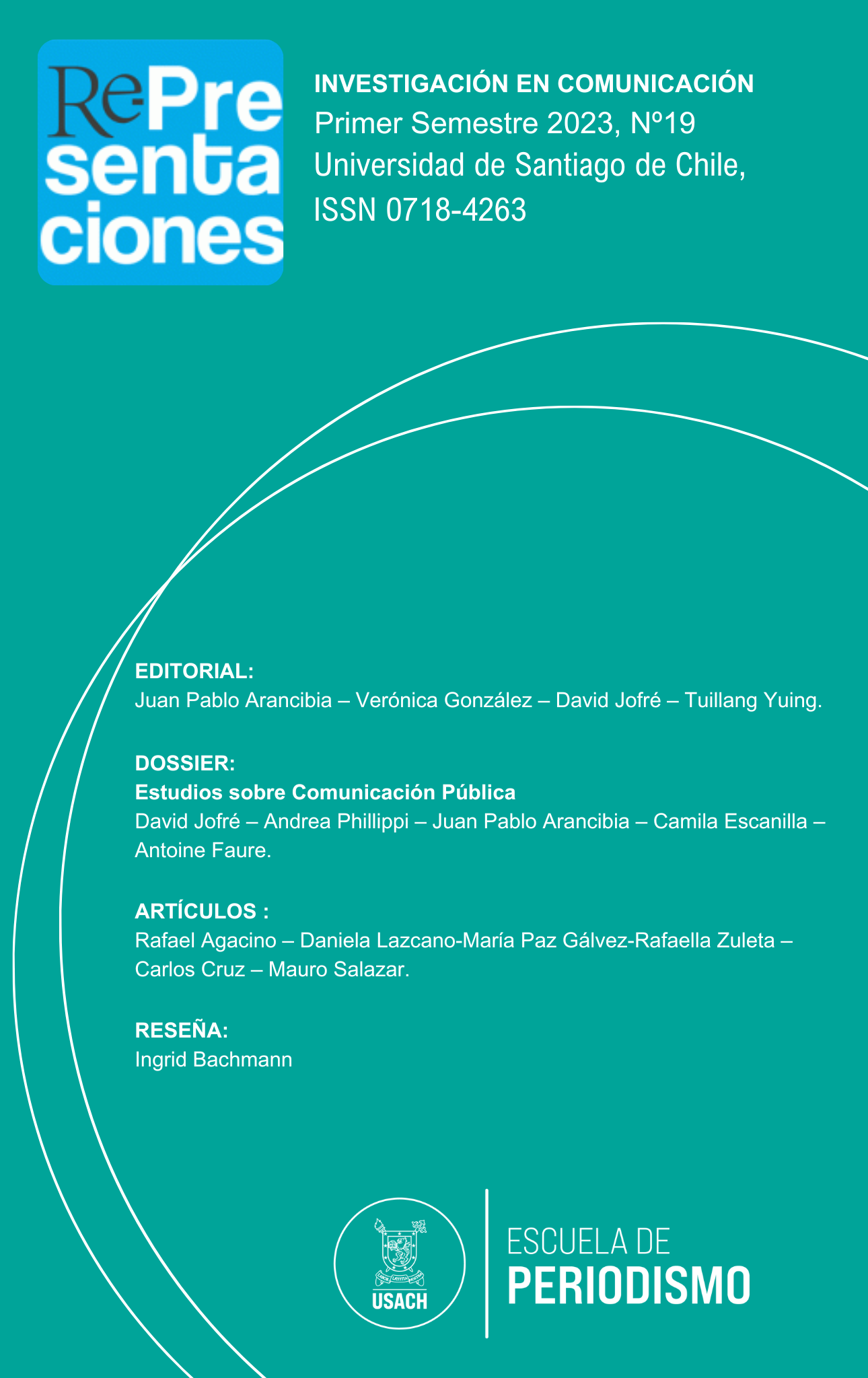IL novecento Argentino. Migration and suburban dialects
DOI:
https://doi.org/10.35588/rp.v0i19.6271Keywords:
dialects, centennial, suburbs, migration, tangoAbstract
As a scriptural text (Barthes), our passages do not seek the progression of an argument, but its "reiteration" in different discursive moments and visual narratives that are illuminated by temporalities. The above invokes fragments of urban-realistic literature, as well as essays and research on dialects and immigration, to account for the complex physiognomy of the city of Buenos Aires and the avatars of the State under the Argentine Centenary (1910). In such a cultural climate, institutional discourses promoted "archives" of urbanization and territorial regulation to build a social pact, which had to deal with "peripheral speech", practices of uprooting and imposing an economy of bodies. Finally, the oligarchy -of Parisian vocation- normalized discourses and migrant practices implementing a crusade against the immorality of the aesthetic porteñas, namely, conventillos, brothels, suburbs, suburbs and the "epidemiological tango" that deformed the future of the port city.
Downloads
References
Arlt, R. (1969) El Juguete Rabioso. Los libros del Mirasol. Buenos Aires.
________ (2020). La química de los acontecimientos. Crónicas y columnas desde Chile. Ediciones La pollera.
_________ (2014). La extraordinaria historia de dos tuertos (Confabulaciones) (Spanish Edition). Eneida Editorial. España.
________ (2015) Aguafuertes porteñas. [1928‐1933], en: Arlt, Roberto: Aguafuertes II. Losada. Buenos Aires.
Artières, P. (2012). “Michel Foucault, retrato de archivo”. Michel Foucault, un pensa-dor poliédrico. Valencia. 29-36.
Azzi, M. S. (1991). Antropología del tango. Los protagonistas. Olavarría ediciones.
Bajtín, M. (1990). La cultura popular en la edad media y en el renacimiento. El contexto de Francois Rabelais. Alianza Editorial.
Barrancos, D. (1990). “Anarquismo y Sexualidad”. En, Mundo Urbano y Cultura Popular. Diego Armus, editor (VVAA). Editorial Sudamericana. Buenos Aires.
Borges, J.L. (1927) “Ascendencias del tango”, Martín Fierro, Año IV, Nº 37.
Cibotti, E. (2000) “Del habitante al ciudadano. La condición del inmigrante: La llegada”, en Nueva Historia Argentina. El progreso, la modernización y sus límites (1880-1916) Tomo V, editado Por Mirta Zaida Lobato, Buenos Aires, Sudamericana, 367.
Ceccon, S. (2021). “Corporalidades y sexualidades no normativas en el tango prostibulario”. Punto Género, 15.
Contorno (1954). Revista denuncialista. Número dedicado a Roberto Arlt. Buenos Aires.
Deleuze, G. & Guattari, F. (1980). Capitalisme et Schizophrénie: l’anti-Œdipe. Minuit..
Deleuze, G. (1990). ¿Qué es un dispositivo? Michel Foucault, filósofo. Barcelona: Gedisa.
Del Valle, C. (2021). La construcción mediática del enemigo. Cultura indígena y guerra informativa en Chile. Comunicación Social y ediciones sociales. Salamanca, 2021.
Devoto, F. (2003) Historia de la inmigración en la Argentina, Sudamericana, Buenos Aires.
Enrique F. (2006). La prohibición del lunfardo en la radiodifusión argentina 1933-1953, Buenos Aires, Lajouane.
Fara, C. (2016). “Visiones de los bordes. Conformación y circulación de las representaciones del paisaje de los suburbios de Buenos Aires entre 1910 y 1936”. Arte y Ciudad - Revista de Investigación Nº 10 – Octubre (pp. 97 - 128).
______ (2020). "Un horizonte vertical: Paisaje urbano de Buenos Aires (1910-1936)", (Ampersand).
Gorelik, A. (1995): “Horacio Coppola: testimonios”. Punto de Vista, Buenos Aires, n° 53.
Galasso, N. (1981). Enrique Santos Discépolo, Escritos Inéditos. Ediciones del Pensamiento Nacional.
Maiz, C (2000). La Argentina de fiesta. El discurso literario frente al Centenario. Un punto de fuga Claudio Maíz. Anuario de filosofía. Argentina.
Maselotti Costa, L. (2007). Pampa, ciudad y suburbio. OSDE. Buenos Aires.
Montaldo G (2014) La culpa de escribir. Columbia University. The Blame of Writing Culpa de escrever. Cuadernos de Literatura. N.º35.
Lugones L. (1916). Hijo de la Pampa: El payador. Otero editor. Buenos Aires.
Piglia, R. (2022). Escenas de la Novela Argentina. Eterna Cadencia. Buenos Aires.
Reyes F. (2020). Prólogo. La química de los acontecimientos. Crónicas y columnas desde Chile. Ediciones La pollera.
Sábato, E (1965). Tango, Discusión y Clave. Ediciones Losada.
Sardi, V. (2000) “El nacionalismo en el umbral”. Análisis del prólogo al libro de lectura Nuestra Patria (1910) de Carlos O. Bunge.
Sarlo, B. Altamirano, C. (1997), Oralidad y lenguas extranjeras. Ensayos argentinos. De Sarmiento a la vanguardia. Ariel, Buenos Aires, pp. 269-287.
________ (1983) Los dos ojos de Contorno. Buenos Aires. Revista iberoamericana. Vol. 49 No. 125. pp. 797-807.
________ (1998) Una modernidad periférica: Buenos Aires: 1920 y 1930. Buenos Aires: Nueva Visión.
_________(2000) “Roberto Arlt: Un extremista de la literatura” en Ñ, Revista Cultural del diario Clarín.
_________(2007) Escritos sobre literatura argentina. Siglo XXI. Edición a cargo de Edición a cargo de Sylvia Saítta.
Sarmiento, D.F. (1845): Civilización i Barbarie. Vida de Juan Facundo Quiroga. Aspecto físico, costumbres i habitos de la Republi ca Arjentina, Santiago: Imprenta del Progreso.
_________ (1868). Conflicto y armonías de las razas en América. S. Ostwald: Editor. Imprenta de D.
___________ (1878). Las cartas de Catriel. El Nacional, 30-XI.
Varela, G. (2005) Mal de Tango. Historia y genealogía moral de la música ciudadana. Historia y genealogía moral de la música ciudadana. Paidós. Buenos Aires.
Varela, G. (2016) Tango y política. Sexo, moral burguesa y revolución en Argentina. Ariel.
Viñas, David (1966). Los dueños de la tierra. Buenos Aires. Eudeba.
_________ (1997). Grotesco, inmigración, y fracaso: Armando Discépolo. Buenos Aires: Corregidor.
_________(1996). Armando Discépolo: grotesco, inmigración y fracaso, en Literatura argentina y política II, Editorial Sudamericana, Buenos Aires, pp. 99-143.
_________ (2022) Historia de la crítica literaria. Ariel Literatura y Crítica Ariel. España.
Downloads
Submitted
2023-08-05Published
Issue
Section
License
Copyright (c) 2023 Mauro Salazar

This work is licensed under a Creative Commons Attribution 4.0 International License.









